Last Updated on January 24, 2026
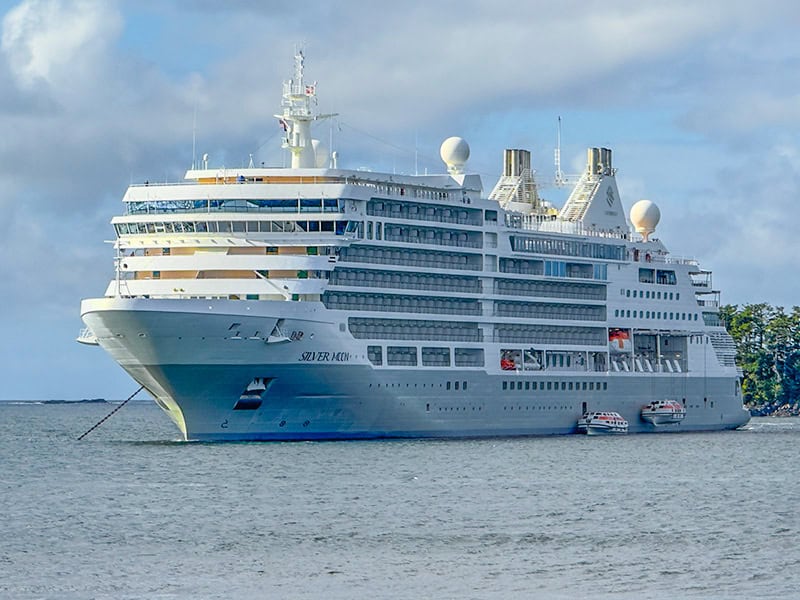
By Jim Ferri and Marjorie Kean
After wandering about Alaska’s beautiful interior by rail and air for two weeks, we thought a Silversea Silver Moon cruise would be a fitting addition to our trip. It turned out to be much more, sending us home with memories of a lifetime.
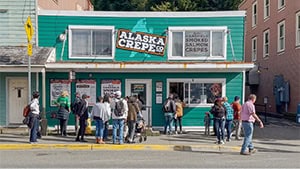
Our pre-cruise Alaskan itinerary had focused on Alaska’s beautiful interior wilderness north of Anchorage. But now we were on the Inside Passage, slowly slipping southward along Alaska’s stunning Inside Passage from Anchorage (Seward) enroute to Vancouver, BC, Canada.
The Passage is a spectacular maritime route stretching 500 miles along Alaska’s Pacific coast. Renowned for its fjords and wildlife, glaciers and lush scenery, most of it is within the Tongass National Forest. Tongass is not only the largest national forest in the U.S., it’s also the largest intact temperate rain forest in the world.
Table of contents
- Silversea Silver Moon – A Beautiful Ship
- Comfortable Cabins / A Doting Crew
- Wonderful Restaurants on the Silversea Silver Moon
- Plenty of Dining Options
- Plenty of Places to Relax on the Silversea Silver Moon
- Nightly Entertainment
- Staying Fit and Lovely
- Juneau: the First Port of Call
- A Gold-Rush Saloon
- Skagway: A Great Rail Journey
- Sitka: A Rich Culture and History
- Ketchikan: Salmon Capital of the World
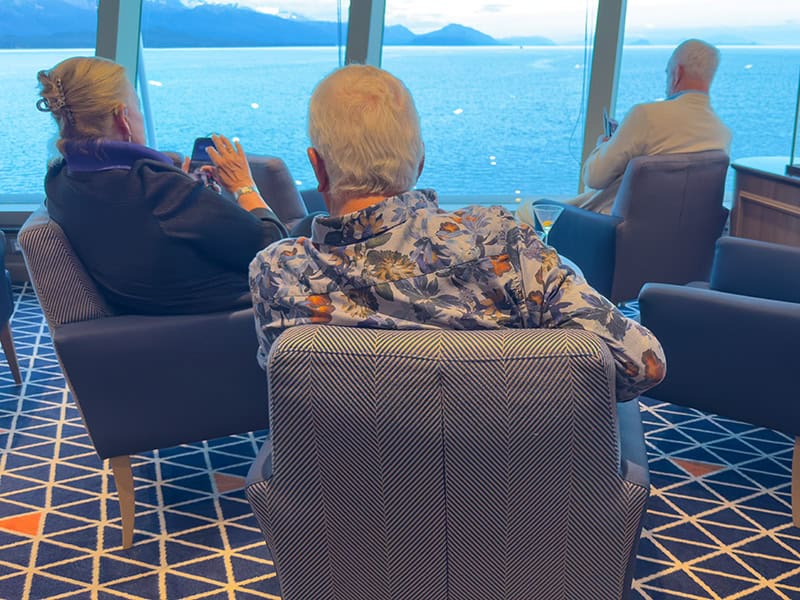
Silversea Silver Moon – A Beautiful Ship
We were sailing aboard Silversea’s Silver Moon, a luxurious 213-foot-long sister ship of Silversea’s popular Silver Dawn and Silver Muse. Each ship has a capacity of only 596 passengers, providing luxurious small-ship intimacy. Each also has a crew of 411, which is the highest crew-to-guest ratio among all cruise ships.
Our Silver Moon cruise was all-inclusive, with most meals and drinks complimentary. The exceptions, as to be expected, are for rarer wines and some meals in gourmet restaurants.
Since there are additional fees for port excursions on the cruise, you may also want to book your cruise through a travel advisor who can offer better rates and/or onboard credits.
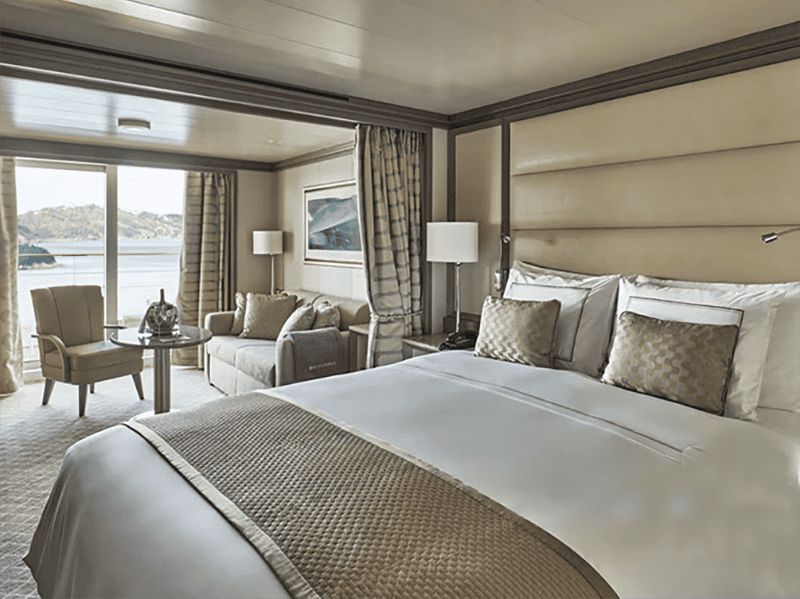
Comfortable Cabins / A Doting Crew
All of Silversea’s Silver Moon’s cabins are suites with ocean views, and most have private teak verandas. Our comfortable Deluxe Veranda Suite on Deck 7 of the 11-deck ship was midship, with easy access to restaurants and other public areas.
Our 387-square-foot cabin (including the veranda) was exceptionally comfortable. Each Deluxe Veranda suite features a king-sized bed, a walk-in closet, a seating area with a TV, and a comfortably sized bathroom with a tub and a separate shower.
The bed sheets are comfortable Egyptian cotton linens, and nine different pillow types are offered. Other amenities you may request include Bvlgari toiletries and personalized stationery. And as expected, you can always ask to have your cabin stocked with your favorite wines and liquors.
Most notably, all suites on the Silver Moon have private butlers. Our butler was extraordinary and daily brought personally made teas and toddies for Marjorie’s cold. He was also there at all hours for whatever we needed, often anticipating our needs. Marjorie considered him a “neat freak” (in the best way possible), who daily straightened up our cabin and desk area.
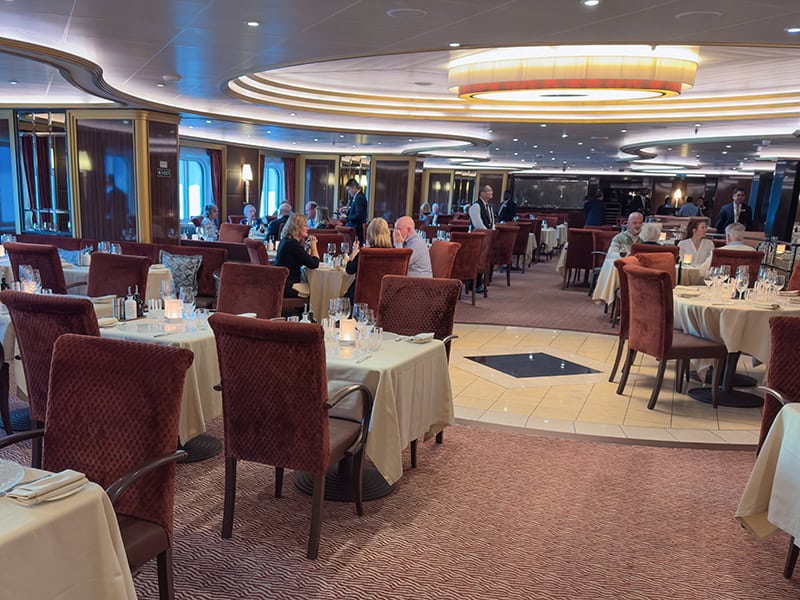
Wonderful Restaurants on the Silversea Silver Moon
For many cruisers, the quality of onboard restaurants is an essential factor in choosing a ship. In this respect, Silversea’s Silver Moon is exceptional. The ship offers eight restaurants, ranging from upscale French to Italian and Japanese, as well as a pizzeria. Many of them would appeal to any cruiser. And although there are no set dining times on Silver Moon, some of the restaurants do require reservations.
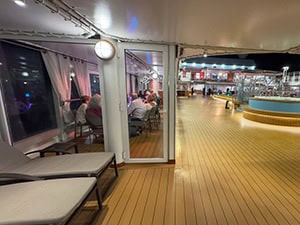
The star of its culinary offerings is the French contemporary restaurant La Dame with custom-made decor created by Lalique. Its excellent French gastronomy is served on white table linens with white-glove service. It is one of the five restaurants that require a reservation (Kaiseki, Silver Note, The Grill (required at night only), and La Terrazza, being the others). La Dame charges a dinner fee of US$60 per person, plus wine, and requires men to wear a jacket. We celebrated Jim’s birthday here.
Although we were unable to have dinner at the upscale Japanese restaurant Kaiseki, we were able to enjoy lunch. Its daytime menu features a variety of sushi, sashimi, and other Asian-inspired dishes, while evening guests enjoy fine traditional Japanese dining.
La Terrazza, Silver Moon’s popular Italian restaurant, which is used daily for breakfast, offers traditional classics (“with a twist”) as well as dishes enjoyed in Italy today. It’s open for breakfast, lunch, and dinner, although reservations are required for the evening. At breakfast, the food stations offer a variety of American breakfast favorites, as well as Asian and European fare.
Plenty of Dining Options
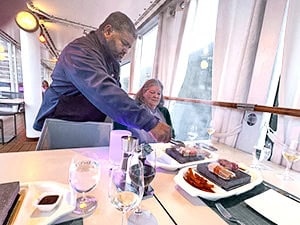
Also popular is Silversea’s Silver Moon’s S.A.L.T. Kitchen (Sea And Land Taste), which does not require reservations and features dishes inspired by the region the ship is sailing in. Silversea describes it as an “immersive culinary concept that enables guests to travel deeper through a range of destination-based gastronomic experiences.” Its S.A.L.T. Lab hosts hands-on culinary classes and workshops on regional cuisine.
We also enjoyed several meals at Atlantide, which, based on the number of diners at any given time, seemed to be Silver Moon’s main dining room. Open for lunch and dinner, the popular restaurant offers international favorites and some American standards. The dinner menu ranges from glazed cod to rack of lamb and even includes one meal consisting entirely of starters.
Among other dining options on the Silver Moon are a pizzeria (Spaccanapoli) and Silver Note (a supper club with live entertainment), as well as the casual poolside The Grill. The latter serves burgers by day and turns into a table BBQ” at night, where you grill your own food. We dined there one night but left, deciding to leave future food preparation to the pros in the kitchen.
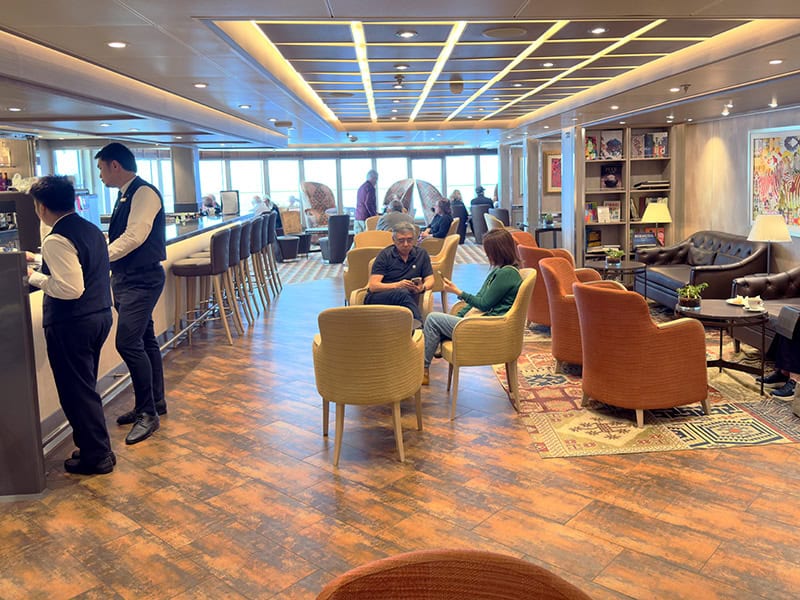
Plenty of Places to Relax on the Silversea Silver Moon
There are plenty of places to relax on the Silversea Silver Moon, including the Observation Library to borrow a book or read the newspaper, the peaceful Panorama Lounge, and Connoisseur’s Corner, the ship’s smoking lounge.
Our favorite place to relax after returning to the ship was the Arts Café on deck 8. A comfortable, artworks-filled lounge, it serves pastries and small sandwiches, as well as wines, champagne, and beer, along with views from its floor-to-ceiling windows. Opt for one of the comfortable tall-back chairs near the windows.
Nightly Entertainment
Although we didn’t frequent it, Silversea’s Silver Moon also has a Casino for those who enjoy American Roulette, Blackjack, Ocean Poker, and video slot machines. The Venetian Lounge is the ship’s venue for musical and theatrical performances.
The piano bar Dolce Vita is popular for pre-dinner aperitifs and post-dinner cocktails. You’ll find live dining and dancing in Silver Note, the ship’s supper club.
Those who require a different type of evening entertainment will find six launderettes scattered throughout the ship (with irons and laundry supplies provided). Complete valet services, including laundry, pressing, and cleaning, are also available at an additional charge (some services are free for certain cabin levels).
Staying Fit and Lovely
In addition to whirlpools and sun beds on the pool deck, Silver Moon also has a well-equipped Fitness Center with free weights and specialty classes. There are also saunas and steam rooms.
The adjacent Zagara Beauty Salon provides a full range of chargeable salon services for both men and women, including hairstyling, manicures and pedicures, acupuncture, facials, body wraps, and massages. We both greatly enjoyed the latter one afternoon after returning from a day tour.
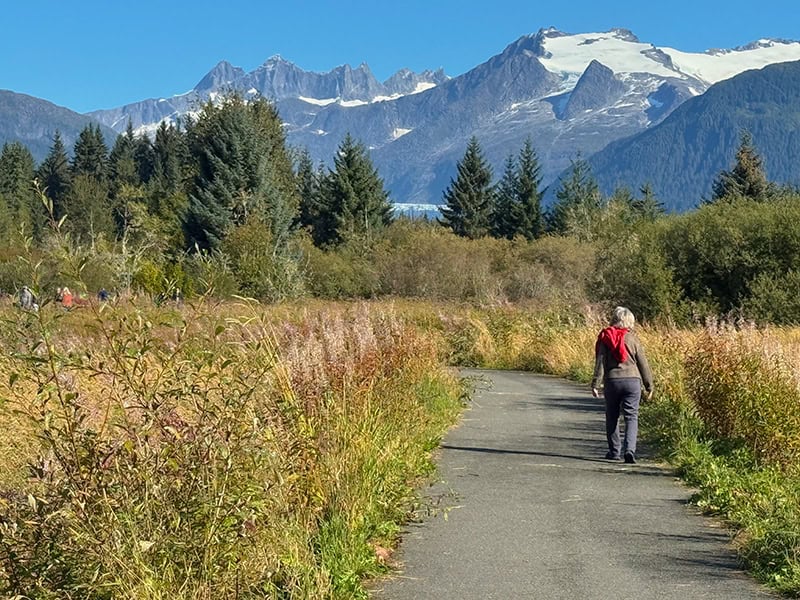
Juneau: the First Port of Call
Juneau, Alaska’s capital, was our first Silver Moon excursion. We found it unique among state capitals in that there is no way of reaching the city except by boat or plane.
We had come via sea, of course, and when disembarking, found ourselves on a boardwalk viewing the majesty of Mother Nature all about us. There were great forests and mountains, but in front of us were totem poles, a large statue of a breaching whale, and a main street lined with shops.
Within minutes, we were aboard our excursion bus and off to view Mother Nature in the Mendenhall Valley and the famous glacier for which it was named. Here, as in all the other areas of Alaska we visited, we found people still have great pride in the wild places and high peaks that surround them everywhere — the same natural wonders that lured the original settlers.
A Gold-Rush Saloon
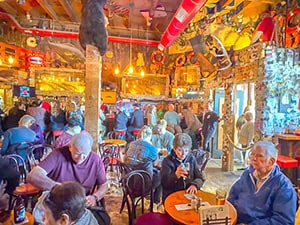
After we arrived back in Juneau, and in search of other attractions, we headed to the Red Dog Saloon. Jim wanted to visit this restaurant/saloon, famous for its replication of a typical saloon from the Gold Rush days. We soon found the line outside its doors a foreboding of its popularity.
It was a crowded place with a thick covering of sawdust on the floor. The place was covered with paraphernalia, with one beam showing a bear chasing a man through a hole in the ceiling. Waitresses in period dress scurried about, as patrons joined a pianist in belting out old tunes like “She’s Coming Round the Mountain.” Some songs, as expected, were a bit bawdier. We found the Red Dog’s food was not its greatest attraction, although it was passable. And neither of us tried the beer, although it was, as expected, in great demand.
Leaving the saloon a bit behind schedule, we headed back to the Silver Moon, stopping in some shops along the way. We soon realized that Juneau’s many shops were undoubtedly one of its primary sources of income. Most of them were jewelry stores, which must have represented nearly half of the offerings.
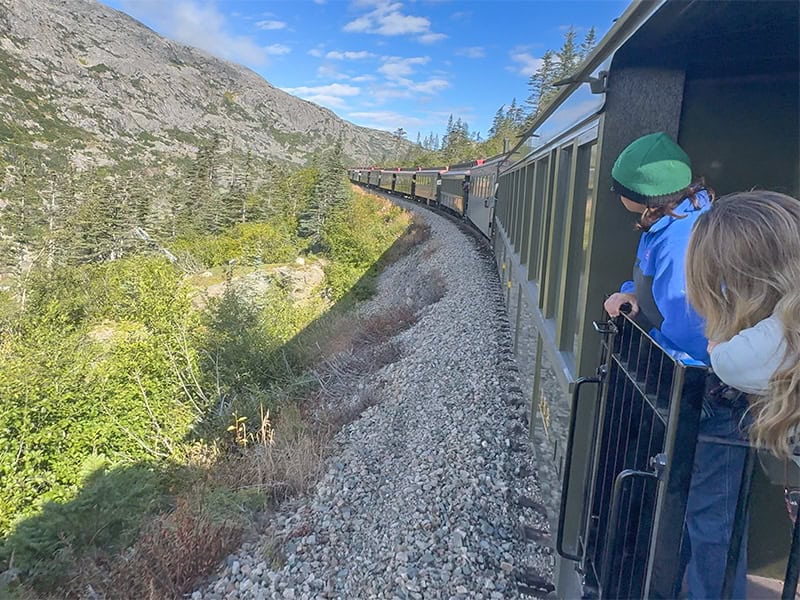
Skagway: A Great Rail Journey
Although Skagway is located north of Juneau, it was our second Silver Moon stop. The highlight of the visit was the White Pass & Yukon Route Railway. Using modern diesel and electric engines, its trains use the restored original cars of the original railway, including wooden seats and a mostly wooden interior. The views include panoramic vistas of mountains, gorges, waterfalls, and historic sites. It’s the most popular shore excursion in Alaska.
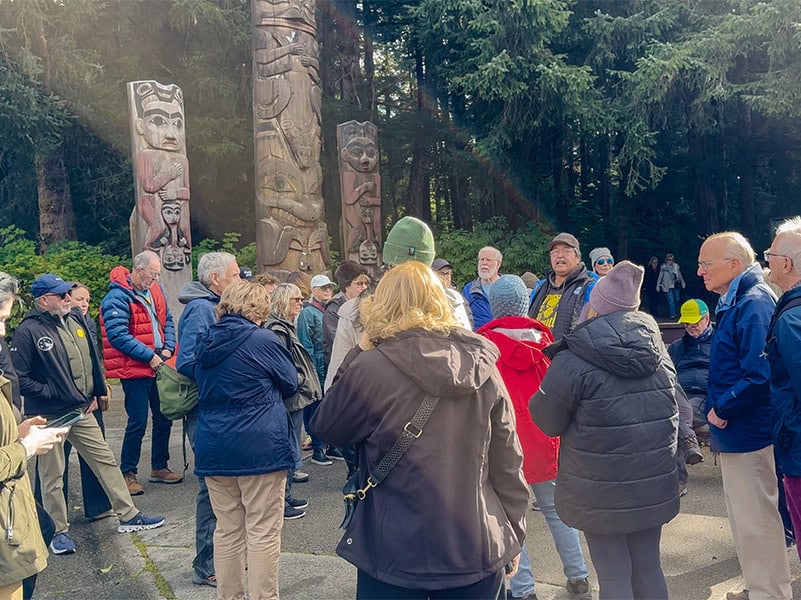
Sitka: A Rich Culture and History
Our port call in Sitka offered by far the best insight into Alaska’s culture and rich history.
In both of our previous stops, wildlife played a significant role in the experience, especially the views of salmon swimming upstream. But in Sitka, we visited the Alaska Raptor Center, where they rescue birds and rehabilitate them. It was fascinating to see owls, hawks, and eagles up close in enclosures that mirrored their natural habitats, as well as to talk with the knowledgeable staff.
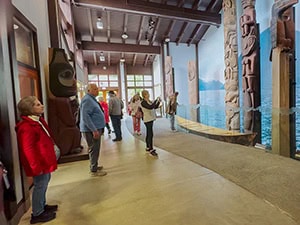
Another unique experience in Sitka was the opportunity to visit the Sitka National Historical Park, where forest trails are lined with totem poles. This was followed by a visit to the adjacent South Alaska Indian Cultural Center. The intricate designs of the totem poles reflect the history and stories of the Native Americans.
Quite by accident, we also had the opportunity to meet a renowned totem-pole carver who creates totem poles by commission and sells them for upwards of $3,000 each.
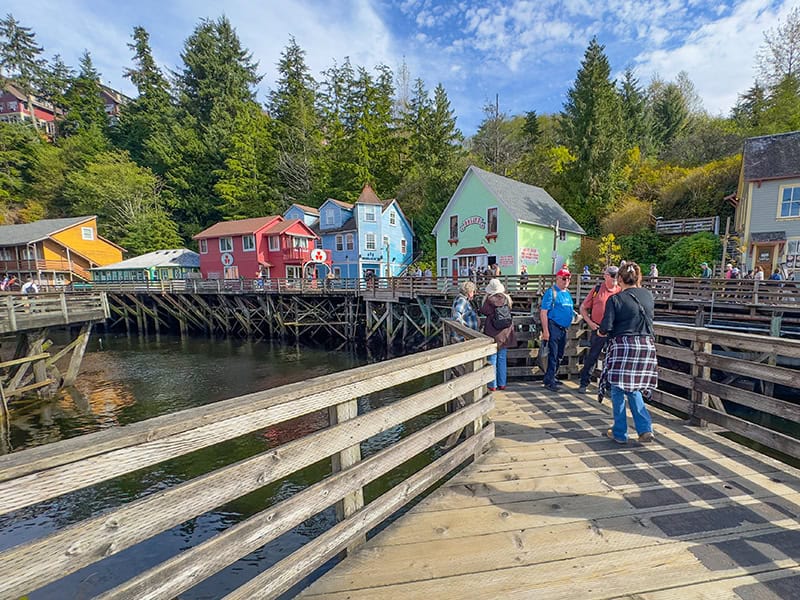
Ketchikan: Salmon Capital of the World
Ketchikan was our final Alaskan Silver Moon port of call before setting sail for Vancouver and disembarking. Even though it is known as “the Salmon Capital of the World,” we were still surprised to see salmon spawning in the river that runs through the city.
One of the city’s popular places, especially for shopping, is quaint, historic Creek Street, where buildings and a boardwalk are built on wooden pilings over the creek. Interestingly, it’s Ketchikan’s former “red light district” where the women learned that proprietorship of their brothels gave them financial independence. Prostitution was once Ketchikan’s #1 industry, and one part of the boardwalk is even known as “Married Man’s Trail.”
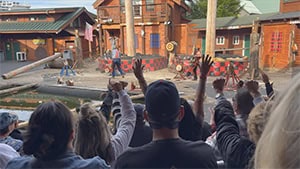
The old brothel houses have since metamorphosed into colorful, unique shops that offer some of the best shopping in town. If you’re planning to bring gifts home from your trip, wait until you visit Ketchikan.
Before leaving Ketchikan we also saw the Lumber Jack Show which is Alaska’s version of a three-ring circus. Great for kids, but not so much for adults.
Jim loved it.

Leave a Reply